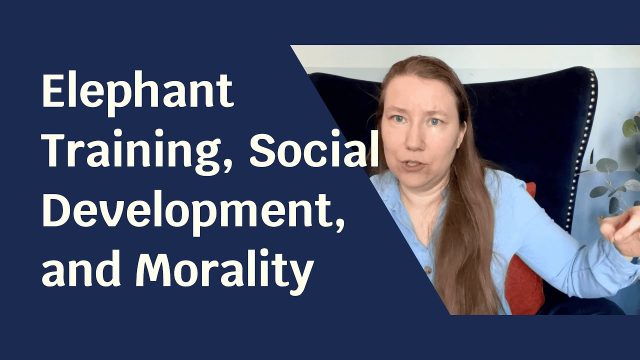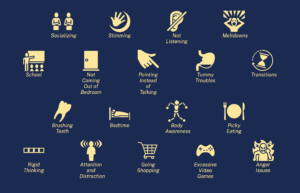
An interesting overlap
I want to talk for a moment about the process of how we’re trained in society to conform to this perceived norm, and how it creates anxiety. And I’d like to start with a story about elephant training.
Now, I don’t actually know for certain whether this is true or not, but I think the image is a useful one in this context. So what I’ve heard is that when elephants are being trained to work with people, the trainer starts off by placing heavy chains around the elephant’s legs and they peg them to a spot close by. As the elephant is trained, it knows the chains prevent it from moving very far. Over time it learns that it can’t move very far, and so it just doesn’t try as much.
The training prevents it from even trying to run away, it thinks that it can’t.
As it gets used to that, they give it more freedom of movement but the chain still blocks it so that it can’t go very far. Over time, they reduce the size and the heaviness of the chain, and they allow it more movement as long as it’s cooperating, as long as it’s doing what the trainer tells it to do, but the chains are still there. It’s still restricting its movement.
They continue to reduce the weight and the size of the chain so that it becomes a leather band. Then, eventually, as it’s more and more trained, they can just put a string around the elephant’s leg and just the presence of the string creates a feeling that has that association with “oh, there’s something around my leg, which means I can’t move very far.” And so it doesn’t try so even though the elephant could run away very easily. The string is not going to prevent it. The training prevents it from even trying to run away, it thinks that it can’t.
Growing up
When we’re very young we are given strong rules about what we can and can’t do, and a lot of what we can’t do, and when we’re very young that doesn’t make sense because we genuinely don’t know the difference between what’s safe and what’s not safe. So we’re told “no” a lot, we’re told “you can’t do that”, and “no, you’re not allowed to”, etc. When we do things that we’re not allowed to, there are consequences.
Later on, as we grow, our society doesn’t have structures that help our moral development to get past that initial right/wrong.
Sometimes it’s natural consequences, you stick your finger in the light socket and you get a buzz that hurts. Ouch! You’re not going to do that. Sometimes they’re punishments by adults around us. Sometimes it’s social punishments, like you say an awkward thing and everyone looks at you funny, or the kids ignore you, or they insult you, or they throw rocks at you, whatever it is.
We’re taught as we grow up that certain things get rewarded, certain things don’t, and certain things are punished. Later on, as we grow, our society doesn’t have structures that help our moral development to get past that initial right/wrong. “This is good”, “This is bad”. “This is okay”, “This is not okay”.
That morally complex area
There are actually a lot more gray areas and there’s a lot more flexibility. There’s a lot more that’s dependent upon circumstances, that’s dependent upon all in this situation. “That was a bad thing, but in this kind of situation that might be okay”, or “In this situation that’s actually a good thing. That’s praiseworthy. That’s helpful. That’s useful.” We don’t have that built into our society, and so a lot of us autistics, and not, stick with these ideas of it’s either always good or always bad. It’s always wrong to do this or it’s always you’re supposed to do this under all circumstances.
Those categories of “good or bad”, “right or wrong”, or “always or never”, they don’t really work in the real world.
Those categories of “good or bad”, “right or wrong”, or “always or never”, they don’t really work in the real world. They don’t conform to all of the infinite variations of life and society. So those associations that we formed when we were very young are still very strong, and what happens is that a lot of us have this conflict in our brains between the right or wrong that we learned and a situation that doesn’t match that perfectly.
It can create anxiety, there can be a feeling of desperation, of “I don’t know what to do. This is something that I was told was right, but it’s not working”, or “This was something that I was told is wrong, but I feel like I need to do that, but if I do that then I’m going to get punished or something bad is gonna happen.” And if you will get it really wonderfully, you might think, “Okay, there’s no one who’s actually going to punish me, but it feels like that”, or “Maybe people will react badly, it’s not that my dad’s going to say anything bad, but my coworkers might or my boss might.”
Living in the complexity
So there’s that conflict between what we learned and what we’re experiencing, and that can create a lot of anxiety. What I think is the most helpful at this point is to start looking at those beliefs about what’s right and wrong. Start looking at them, examining them, like “Is this absolutely true? Can I think of any circumstances in which this wasn’t used this way and it actually worked out better? Do I know examples of people who have done something differently and have been praised for it?”
There’s that conflict between what we learned and what we’re experiencing, and that can create a lot of anxiety.
Instead of villainizing it, we start looking for counter examples, start looking for the ways that it might not be true. It might genuinely be true sometimes, but not always. Being able to live in that… I’m tempted to call it “gray area”, because that’s a common term, but I don’t think it’s actually a gray area. It’s not like it’s morally fuzzy, it’s just morally complex or pragmatically so.
It’s not about whether everything is always right or wrong. It’s about how we live in a complex world, a world that doesn’t always fit neatly into these categories that were taught when we’re two years old, or five years old. Playing with that a little bit, allowing yourself the freedom to explore that, even if it’s just in your head. You don’t have to go out and live this yet, just play with it in your head and see what comes up for you.




